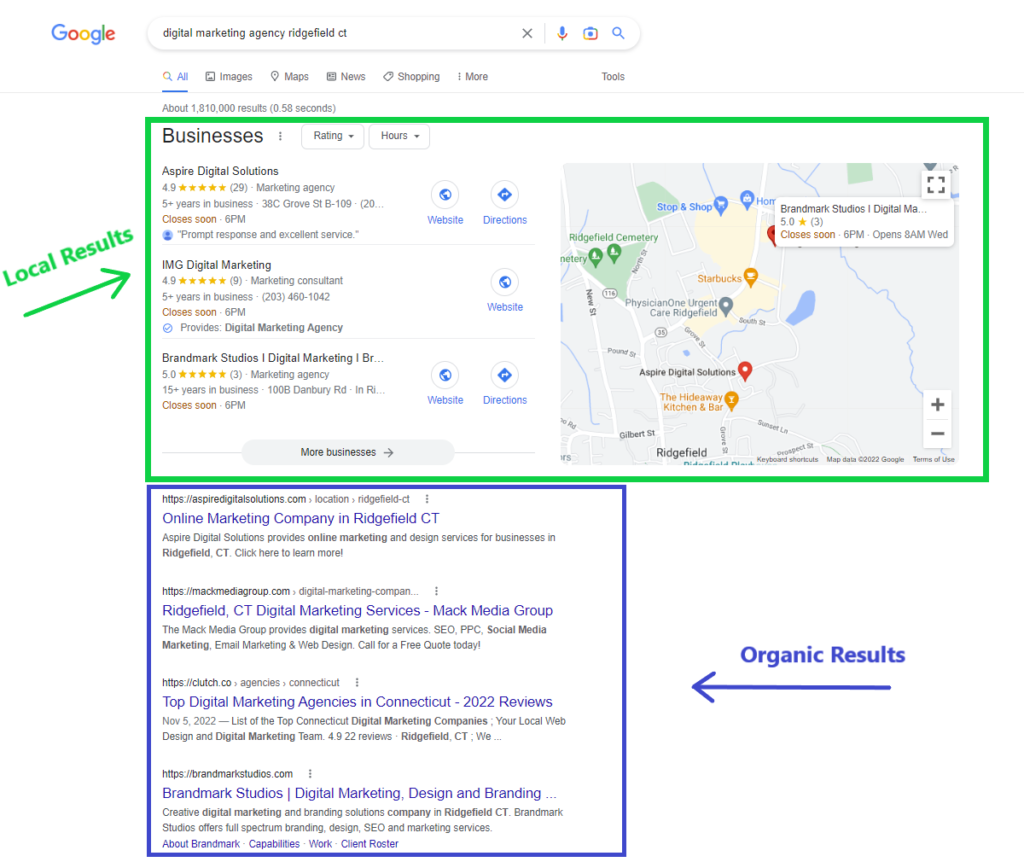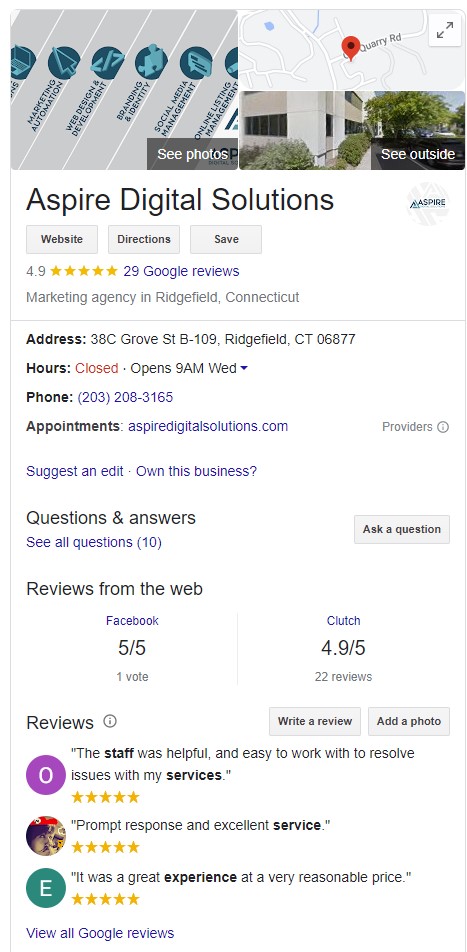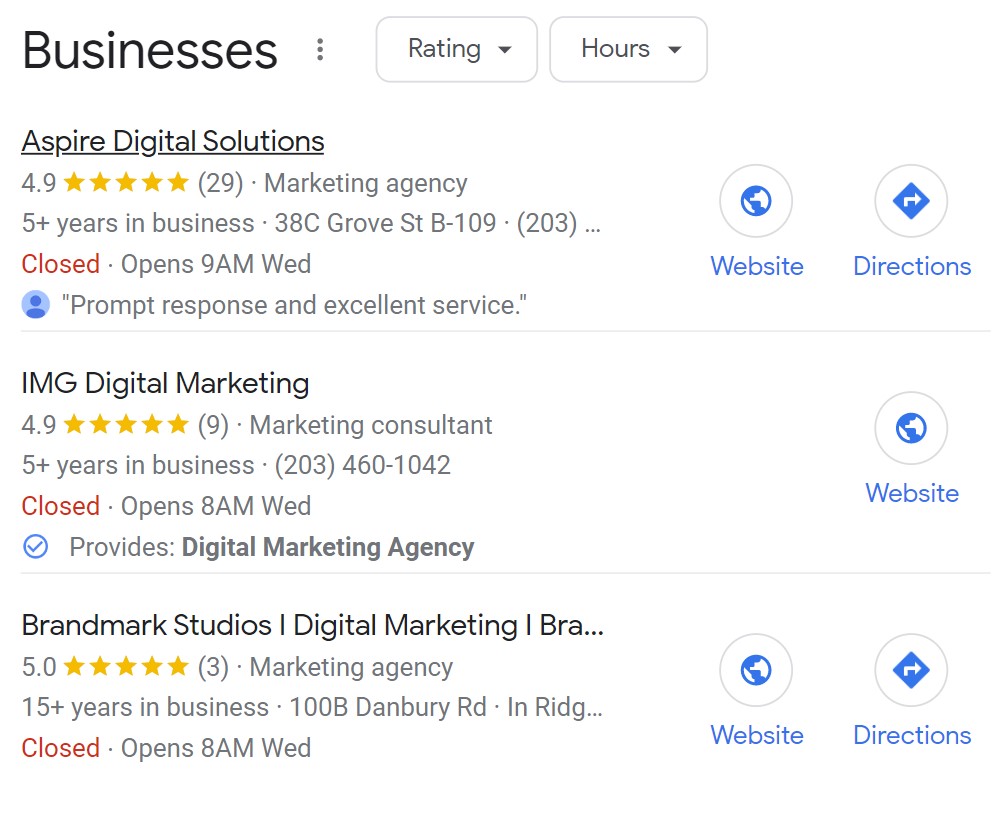Organic vs Local Organic Search Results in Google
When someone searches for a given search term on Google, one of the determinations the search engine makes is whether or not the search has ‘local intent.’ Searches with local intent include things like “near me” or searches by location, as well specific service types like “hair dresser” or “therapist.”
What happens when Google determines a search has ‘local intent?’
When a Google search has local intent, the search engine returns what is called local results. What appears on the user’s screen (both on mobile and desktop) is commonly known as the Google Maps 3 Pack, or simply the Google Local Results.

These Google local results appear above the ‘regular’ search results. On mobile phones, this is particularly important – with narrow screens on the majority of mobile devices, many users never make it past the local results.
Do people click on Local Results?
Yes! In fact, according to Localiq, Google has recently reported that an incredible 46% of all searches have a local intent! That means that Google My Business listings are more visible than ever, and with only the top 3 showing prominently, you need to rank well in your service area if you want to get the largest percentage of those clicks!
How do I get in the Google Map Pack Local Results?
The listings in the Local Results are powered by a company’s Google My Business listing, commonly known as a GMB listing or GMB page. When properly optimized, a company’s GMB listing can begin to rank in Local Results. To create a Google My Business listing, you can log into business.google.com and enter your business details. Alternatively, if Google has already created a listing for you automatically, you can claim this listing.

After claiming or creating your listing, your GMB profile must be verified, either by phone, text, post-card, or video verification.
Once your company is in control of their GMB listing, you can update all of the information within the profile. It is strongly recommended that this be done immediately, as your GMB profile is often the first contact a user has with your business on the internet. It provides your phone number, address, photos of your business, a link to the Google Map and directions to your location. It also houses all of your reviews, Google posts, and other mentions on the web. In essence, your GMB listing is the hub of your business on Google. And with Google holding over 90% of the market share, Google is where your business needs to be visible online.
What determines how I rank in the Google Local Results?
Google My Business pages are ranked by several factors:
- Proximity to the searcher.
- Review rating and count.
- Traditional SEO ranking factors (backlinks, on-site factors, and others).
- GMB categories and services offered.
- Use of GMB features like Posts, Images, and answering questions about your business.
- Local, hyper local, and niche business citations.
- Time in business.

No particular local ranking factor is the most important (though many arguments and debates can be had on this topic), however the recentness of reviews (and how good they are), the use of built-in GMB features, and local citations all play a very prominent role in the ranking of a Google My Business page.
Is ranking in the Local Results harder than ranking in traditional Organic Results?
Yes and no. Directly improving your GMB listing’s rank in Local Results (to the top 3) within a service area can be difficult, especially if your competitors have a well-established online presence in the region. Ranking in traditional Organic Results requires effort, but the multitude of different methods that can be used to approach traditional SEO gives you an advantage in this department. By contrast, GMB SEO and SEO for Google Maps are relatively new fields, compared to traditional SEO, and so there are more unknown in terms of what it takes to rank well.
Despite that, there are still many proven ways to improve a business’ GMB rank, and they are the typical things that Google (and through them, the user) values. As mentioned above: Reviews and social proof, connections to and from external sites and social media platforms (directories, backlinks, citations), locally-focused content on your website, NAP (name, address, and phone number) consistency across all business listings online, and the use of the built-in GMB features are all proven ways to naturally increase your rank in Google Business, and in Google Search Results in general.








0 Comments